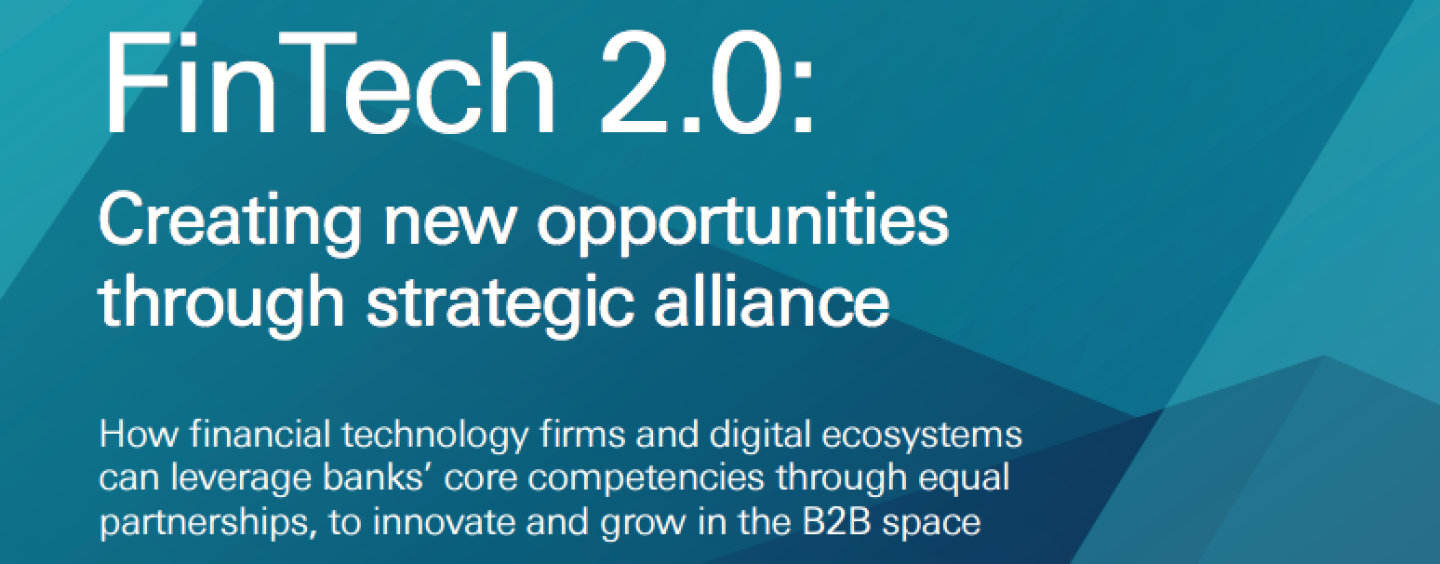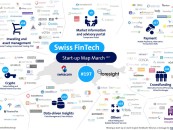
Deutsche Bank Releases ‘Fintech 2.0’ Whitepaper, Advises Startups and Banks to Collaborate
by Fintechnews Switzerland February 23, 2016Banks and fintech startups should collaborate rather than compete against each other, says Deutsche Bank.
In a new whitepaper entitled ‘Fintech 2.0: Creating new opportunities through strategic alliance,’ Germany’s largest bank calls for “a shift in mindset from one of competition to collaboration,” arguing that traditional banking providers and new innovators must work together in order to revolutionize the payments market and the wider financial sector for the benefit of all.
“Of course, banks and fintechs have different comparative advantages and weaknesses; factors that need to be identified and combined if they are to deliver technological offerings that meet changing customer expectations,” the documents reads.
“For both parties, a partnership should liberate them to focus on their core competencies and contribute these areas of expertise to the innovation process.”
Fintech innovation, described as “a constant force,” will unquestionably change the way people interact and conduct business. Hence, banks that wish to safeguard their market share will need to develop a strategic plan in order to remain competitive, while complying with a changing and increasingly complex regulatory environment and managing market risk.
Fintech startups, on the other hand, will need to find a way to meet their regulatory, investment and risk needs in order to focus on their core competencies. These players “may find partnering with a global banking provider to be the most strategic approach in this regard, and many of the developments of coming years will likely evolve within such alliances.”
All in all, both parties will benefit from collaborating with each other, leveraging their respective strengths to revolutionize the financial sector, the bank says.
Process of partnership and recommendations
Opting for ‘Fintegration‘ rather than competition is one thing, but what are the factors that need to be taken into account when considering a strategic partnership? How do we proceed?
Deutsche Bank gives several recommendations that should allow both parties to fully benefit from a bank-fintech alliance:
Focus on core competencies
Banks and fintechs have different comparative advantages and weaknesses. These factors need to be identified and combined if they are to deliver technological offerings that meet customer’ needs and expectations. For both parties, a partnership should liberate them to focus on their core competencies and contribute these areas of expertise to the innovation process.
Identify a suitable partner
Banks need to identify their needs. These needs must be in line with their business model and strategic objectives. Once these needs have been identified, a partner fitting those criteria must be selected.
“A successful alliance will be the result of well-balanced mutualism; two parties that bring complementary core competencies and resources together to innovate and offer a new value proposition that benefits both, as well as addressing a market need.”
Different types of partnership
Once the “who” question has been answered, the “how” must be addressed, meaning the practicalities of working together. Partnership model can differ significantly: a bank and a startup can work together on a product that would be commercialized under both brands; or a bank can choose to leverage a fintech-offering as a white label product and pay a license fee.
Factors for long-term success
Mindset alignment: Both sides need to have an adaptable attitude, open to potential shifts in mindset. In order to exploit the advantages of a bank-fintech alliance, banks must approach the fintech counterparty as an equal partner rather than a vendor. Both sides must meet as equals and bring equal intellectual value to the venture.
Technical compatibility: Entering into any partnership will require adaptation and flexibility from both sides. Banks will need to embrace APIs as a protocol that allows them to communicate with clients in real-time in an almost unlimited manner. This will be crucial for new solutions reliant on accessing up-to-date bank data.
Read the full report: http://www.gtb.db.com/docs_new/GTB_FinTech_Whitepaper_A4_SCREEN.pdf






6 Comments so far
Jump into a conversationDie Veröffentlichung des Whitepapers Deutsche Bank Fintech 2.0 unterstreicht die Bedeutung der Erstellung präziser Dokumententexte in der sich schnell entwickelnden Fintech-Branche. Bei diesen Diskussionen ist es wichtig, die Bedeutung von Recherche und Analyse für die Gestaltung Ihrer Schreibstrategie zu erkennen. Wer auch hochwertige Texte verfassen möchte, sei es für ein Dokument oder für verschiedene Arten von Arbeiten, dem empfehle ich, sich an bestimmte Dienste zu wenden, die sich mit verschiedenen Arten von Schreibarbeiten befassen!
The work that has gone into compiling and writing this document is excellent! Since I’ve had trouble writing problems like this in the past, I can’t recommend ghostwriter writing service enough! Their services have been a real lifesaver for me when it comes to efficiently and professionally solving various problems associated with writing various types of papers. The service’s attention to detail, expertise and commitment to customer satisfaction truly sets it apart from others. If you need reliable writing help, look no further than this service!